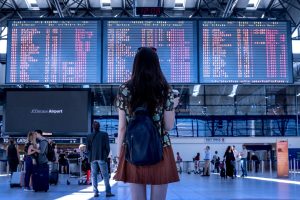Cruising Altitude is a weekly column about air travel. Have a suggestion for a future topic? Fill out the form or email me at the address at the bottom of this page.
When Southwest Airlines announced last month that it was tightening restrictions on how and when it would provide refunds for additional seats purchased by plus-size passengers, advocates for travelers who have come to rely on the policy were frustrated.
The airline’s new policy, which will go into effect on Jan. 27, will only make refunds available to plus-size passengers if there’s at least one empty seat on their flight, both seats were purchased in the same fare class, and the traveler requests the refund within 90 days of their departure. Previously, the airline placed fewer conditions on its refund policy.
Before you clog my inbox with comments about how you disagree with even Southwest’s more restrictive policy, I just want to say: I don’t want to hear it. Being fat is not a moral failing for which people should be punished. While the airlines are undeniably cramming us all in regardless of our waist size, for passengers who truly don’t fit in a standard economy seat, policies like Southwest’s help not only them but their fellow travelers be safer and more comfortable onboard, and that’s a good thing.
“Everybody should have the amount of space that they need. I don’t actually need a full second seat. I need one more inch,” Tigress Osborn, executive director of the National Association to Advance Fat Acceptance, told me. “More often than not, the person on the other side of you is getting the benefit of that space as well.”
Jeff Jenkins, founder of Chubby Diaries, told me that flying can be an especially stressful experience for plus-size passengers, and policies like Southwest’s help make it a little easier, even as the airline makes it harder to get those refunds.
“There’s this deep anxiety that plus-size people get from flying and that’s usually the first required thing to traveling around the world or traveling around the nation at times. It’s very anxiety-driven,” he said.
Even after the policy change goes into effect, Jenkins said, Southwest will remain the industry leader in accommodating plus-size travelers.
“As much as I am disheartened by what Southwest has done, they still are leading every other airline. They’re still doing the refunds,” he said.
Osborn said she hopes Southwest reverses its decision to restrict its refund policy and that other airlines become friendlier to fat travelers.
“I would want other airlines to hear, everybody can improve their policies around this and their procedures around this,” she said.
Until then, here’s where things stand and what plus-size travelers need to know about flying with the four major U.S. airlines.
As Jenkins mentioned, Southwest still has the most generous plus-size policy of the major U.S. airlines. Here’s what travelers can expect from the Big Four:
Jenkins said that being plus-size doesn’t mean you can’t travel, but he said it’s important to plan ahead and make sure you can do so comfortably.
He relies on websites like SeatGuru or aeroLOPA to make sure he knows the dimensions of an airline’s seats in advance, and to help him determine if he requires an extra seat when he books.
Jenkins said he almost always just flies first or business class now to take any concerns out of the equation, but acknowledged that’s not possible for many travelers.
Still, he said, it’s a good idea to budget extra if you’re going to require extra space.
“If you budget the two seats to where you’re buying two seats automatically, it does make it easier,” he said.
Osborn agreed that it can make things smoother to buy an extra seat in advance, but said that airlines don’t always honor that booking or keep the seats together.
“One thing about all airlines is, even if you have paid for your second seat, if they need that seat, they’re going to try to take it from you,” she said. “I was put in the position of, ‘we’re one seat short for this family, and if you don’t give up your second seat, one person doesn’t in the family doesn’t get to go home.’”
Adding to the insult, Osborn said the airline never refunded her even after it reclaimed the seat she had paid for.
Jenkins said that for travelers who don’t want to lay out extra money, it’s best to keep an eye on flight loads before and after you book, and be prepared to move to a flight that looks less full so you can get an empty adjacent seat.
Osborn said she hopes that airlines revisit their policies and become more accommodating, but she also hopes that fellow passengers just start being kinder to each other.
“It’s not just that we’d like to see them go back and other airlines improve, it’s that we’d also like to see our fellow passengers treat us with respect,” she said. “You have to face the walk of dread where you can see other passengers watching to see if you’re sitting next to them.”
Zach Wichter is a travel reporter and writes the Cruising Altitude column for USA TODAY. He is based in New York and you can reach him at zwichter@usatoday.com.




